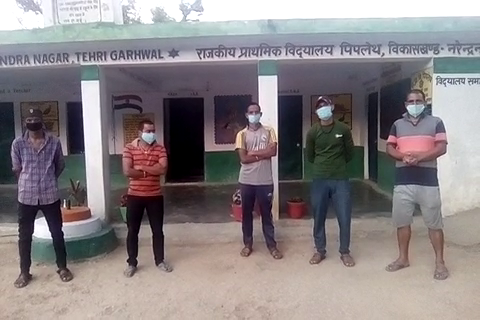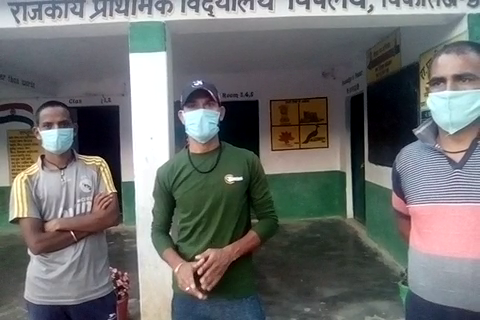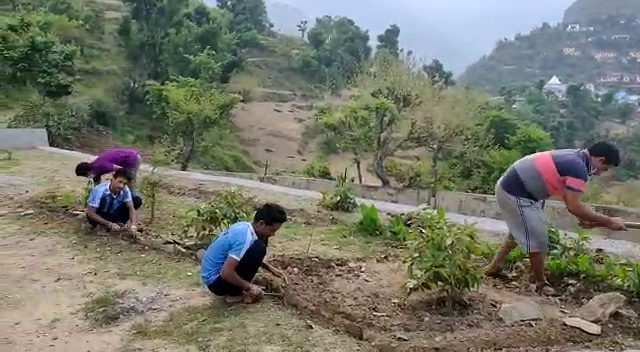Migrants, who are back to the hilly state of Uttarakhand, are now staring at a bleak future
Uncertain of the future, these young men and women are spending days and nights at the quarantine centres trying to overcome the bitter memories of the past two months

The images of migrants, carrying their reality on their heads, starved and exhausted, marching relentlessly only to return to their villages, will continue to haunt us for the rest of our lives. The nationwide lockdown was not only unfair to the poorest of poor but was inhumane, to say the least. As per the SaveLife Foundation, a total of 198 migrant workers lost their lives during the four phases of lockdown. The politics took precedence over the plight and it took our leaders almost two months to make arrangements for their return. Finally, millions of workers returned to their native villages across states; albeit to face new challenges.
In the hilly state of Uttarakhand, villages are witnessing the return of many young workers from different states, largely metropolitans. With compulsory quarantine ordered by the state government, all the returning workers are kept in the quarantine centres set up by village heads. Following the rules, they have been instructed to spend two-three weeks in these centres. Uncertain of the future, these young men and women are spending days and nights worrying about what life holds for them next while overcoming the memories of the last two months that have been excruciating.

Most of them worked in the hotel industry and were working as cooks. While a few were fortunate as their employers made arrangements for their stay and ration, most of them survived the lockdown by exhausting their meagre savings. Many faced existential threats. “Three of us were stuck in a guest house in Ahmedabad in Gujarat where we had migrated for work. Each day, we would spend Rs 200 as rent for our accommodation and for cooking food, we would buy 5 kg for Rs 50. This continued for one-and-a-half months and we strained all our resources. It was because of the persistent efforts of our families that helped us get through,” said Rajendra Nakoti, who is from the Jaad village. He also shared how the coordination between their families, the Uttarakhand administration and the Ahmedabad administration, helped them get ration for 10-15 days.
Another young man, Ramesh Singh, shared that he worked in a restaurant in Delhi’s Connaught Place. His employer had denied paying him his three month’s salary. After intervention from the Migrant Associations of Uttarakhand, the employer paid him his one-month salary and promised to pay the rest of the amount once his restaurant resumed operations.
After spending the most uncertain days of their lives, these workers took a sigh of relief when the government passed the orders allowing the movement of migrants to their respective states. The journey to return home, however, has been even more agonising. Almost every youth the writer spoke to had to stand in long queues – from getting the pass made to get on the buses and trains destined to take them home. Many of them who failed to make it to these government-arranged trains and buses, had to hire taxis by spending anything between Rs 15 and 30,000 to reach home.

After crossing the hurdles, these women and men reached Uttarakhand only to face discernment by their own people. Gambhir Singh Rana, who returned from Ahmedabad, shared that he couldn’t reach the quarantine centre of his village as the head and the taxi drivers from his village had denied him the services. Fearing that he could be carrying the virus, they asked him to trace the journey on-foot. “I had travelled for 24 hours straight to reach Uttarakhand and the treatment I received from my own people after returning just killed whatever hope was left in me,” shared Gambhir. With the help of a local organisation called Jagriti, he managed to hire a taxi to his village that costed him more than his journey from Ahmedabad to Rishikesh.
At the quarantine center, these workers are not only spending time in isolation but are staring at a bleak future. To help them cope with the situation, local NGOs are organising discussion sessions with them. With enough time on hand, these young, hardworking women and men have cleaned, white-washed and painted the quarantine centres they have been stationed at. Helping them move forward, the Uttarakhand government has announced a scheme under the Mukhya Mantri Swarojgar Yojana under which loans would be given to the migrants returning to the state for self-employment. Let us hope that through these combined efforts of the government and non-government organisations, these young men get a second chance to rebuild their lives.
(Names have been changed)
This article has been sourced from Charkha Features

